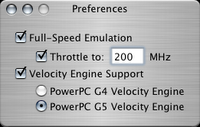Why didn't Apple just go with Motorola/Freescale's new dual-core 8600 chips? Why did they have to make the huge jump to Intel?
Because of Motorola/Freescale's sterling reputation at delivering fast chips so early and often, Apple decided it would rather not play keep-up and go with a more predicable partner that wouldn't constantly be one step ahead of them. IBM's Power5 and gaming console plans proved to be too rich for Apple to work with as well.
Will my Mac run faster than it did on PowerPC chips?
No, not at all. Apple designed this move to push its processor speed back a few notches since first Motorola and now IBM have been introducing speedy new processors so often. The move to Intel architecture chips will keep Apple at a stand-still like the rest of the PC industry, something akin to the 500 MHz Fiasco of 1999 — the last time Jobs and co. were truly happy with their processor partners.
Will I be able to run System 6 software on Intel Macs? Apple will include Classic with 68k emulation, right?
Absolutely. And what a great idea too! Apple realizes the importance of running decades-old software that its users can't upgrade from due to stubbornness or misplaced sentimentality and so has invested millions in making sure you can bring your antique computer programs with you to the next Mac platform.
Will this be like the 68k-to-PowerPC switch?
It most assuredly will. If Apple learned anything from previous platform migrations it's that developers don't want it easy. Thanks to Xcode 2.1 and the general structure of Mac OS X, the port to Intel will take at least 10 years and run software slower than ever before — until Apple can crank out a "native" version of OS X since it's never run on these processors before.
So with Rosetta I can emulate a Power Mac, right? Can I just emulate the whole OS on it? I hate Intel! PowerPC forever!!!

Sure you can, but don't forget to enable the "Full-Speed Emulation" checkbox that lets you emulate your dual 2.7 GHz Power Mac G5 at full speed with AltiVec. This means that all of your software will run in PowerPC mode so you don't feel like a cheap dirty technology sellout running on Intel processors.
Will this mean Macs will be cheaper because they're using commodity hardware?
Yes. You can expect your Mac purchases after 2006 to be hundreds of dollars cheaper than ever before, since the processor makes that much of a difference in the bottom line and Apple hasn't been using any other common PC components before now.
Intel Mac minis should sell for $99 and new quad-processor Power Mac systems with Intel inside will start at a modest $999. iMacs and eMacs will hover somewhere in the $399-599 range, while iBooks will start at $299 and PowerBooks at $499. High-end servers based on eight-way Pentium Extreme chips and 32 gig of RAM might crack the $1999 boundary, however.
Can I install Mac OS X on my sweet dual Pentium Pro box? I overclocked the processors to 233 MHz so it really cooks.
You sure can. Apple made it so that you can install Mac OS X on any Intel PC dating back to the original Pentiums in all 60 MHz of their glory. Never-mind that they're equivalent to PowerPC 603 chips at the same clock speed and that Mac OS X would run like molasses in Winter on them — Apple has made it easy to bypass their hardware and sincerely want you to run their software on something that will make you curse its speed to the lowest pit of Hell.
No comments:
Post a Comment